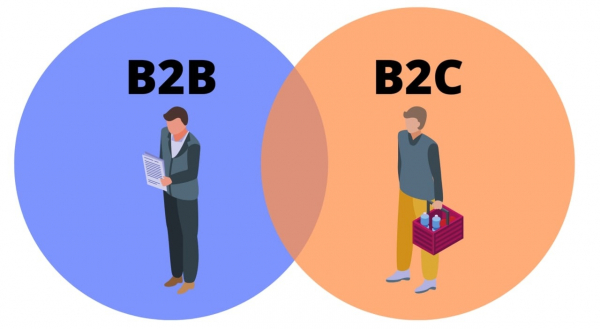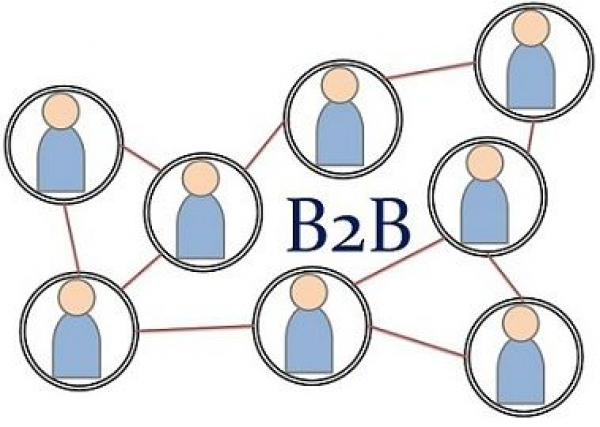What’s the Difference Between B2B and B2C Branding?
- by B2B Desk 2024-05-23 10:22:42
B2B and B2C are the two most commonly seen acronyms. B2B stands for business-to-business and refers to a type of business that takes place between one business and another. B2C refers to business-to-consumer transactions that occur between businesses and consumers.
While B2B and B2C closely follow the same equation – customers buy from companies – there are some important differences between the two approaches that need time to understand.
What is B2B Marketing?
B2B marketing stands for business-to-business marketing. It involves one company selling goods or services to another company. Therefore, B2B marketing needs to prioritize the concerns, difficulties, and requirements of companies.
What is B2C Marketing?
B2C marketing stands for business-to-consumer marketing. It is the operation in which a company sells goods or services to people. Therefore, B2C marketing must prioritize the concerns, difficulties, and requirements of specific customers.
B2B VS B2C Branding
Customer motivation
B2B sales are largely driven by logic and reason. Decisions are based on facts, figures, and statistics. Emotions include anxiety about poor judgment; Branding the business as an expert helps avoid this concern.
B2C sales are largely driven by emotion, whether it's fear, awareness, or desire in the situation. Branding is achieved by appealing to market sentiments.
Potential sales volume
B2C campaigns can reach people who are interested in a product even if they are not the customer. For example, a product intended for children can appeal to the decision maker at home by directing them to get them to buy something.
however, B2B brands do not have that same advantage. That's because, in B2B marketing, products are meant for businesses, and businesses tend to be smaller than people in a certain demographic.
While detail is important for both, B2B marketers should break it down by industry, business size, revenue, and more when choosing which one to target. looking for.
Emotion vs. logic
B2C marketing also relies on attracting potential customers to make a quick purchasing decision. This means their experience is more fun and enjoyable. Think TikTok videos, YouTube videos, and social media endorsements.
In B2B marketing, it is common for marketers to aim to progress prospects to the next phase of the sales funnel. This could entail anything from arranging a complimentary demonstration to beginning a subscription. B2B marketers need to think about running campaigns aimed at various stages of the marketing funnel. This enables them to convey the correct message to the appropriate audience at the optimal moment.
In addition, B2B personnel have higher requirements for efficiency and knowledge than sales teams. As a result, purchasing decisions are often influenced by logic and financial motivations rather than emotions.
Growth And Retention
In the B2B world, the focus is on making customers happy. Customers have a lot of influence because they are often connected to other potential prospects. Businesses in this space often have a limited number of customers in the early stages, so prioritizing their needs and keeping them happy is crucial. In B2B, it is more common to have direct communication with customers, leading to a better grasp of their pain points.
B2C startups, on the other hand, face the challenge of solving various customer problems and requests as they scale. As your customer base grows, meeting everyone's needs becomes more challenging. Prioritization becomes critical and startups must focus on specific market segments.
While B2B companies often build based on problems identified by their core customers, B2C startups may need to strike a balance between meeting the needs of current paying customers and building for the broader market.
Understanding your target audience’s unique needs and preferences is a critical step in determining the right strategic marketing approach. By understanding the differences between each business model, companies can develop marketing strategies that produce positive results and foster customer loyalty.
B2B Vs B2C Marketing: Which strategy is most suitable for my needs?
When deciding between B2B and B2C marketing, you need to consider who you want to reach. Again, it all goes back to the company and the individual. You can use a combination of B2B and B2C marketing techniques in separate campaigns if you target prospects in both segments.
Another thing to consider is your budget. B2C marketing typically spans a wider range of platforms, channels, and advertising types. If you have the luxury of reaching your audience through a variety of mediums, it may be worth considering a B2C marketing approach.
B2B products can gain mass appeal to individuals and vice versa. In this case, you can take the opposite approach and test small campaigns to see which one works best for your brand.
If you have a small budget or a niche product, a B2B marketing approach is ideal. Although it may require more planning, this method makes it easier to reach high-ROI leads.
FAQs
Q. What is the difference between B2B and B2C branding?
A. To succeed, B2B companies need to clearly demonstrate how their product or service benefits the customer. They often use marketing tactics such as webinars, press releases and targeted ads to reach their audience. B2C companies usually have simpler products, often with more consumer-oriented branding.
Q. What is a B2C brand?
A. Key Takeaways. Business-to-consumer refers to the process of businesses selling products and services directly to consumers, with no middle person. B2C typically refers to online retailers who sell products and services to consumers through the internet.
Q. What is branding in B2B?
A. What is B2B branding? B2B branding helps buyers make sense of competing offers from different companies to decide which will best help them solve the needs they have. An effective B2B brand: Is clearly identifiable. Has a well-articulated, long-term purpose and vision.
Q. Is Mcdonald's B2B or B2C?
A. Some examples of Business to Consumer companies are McDonalds, Walmart, and Netflix with its creation and delivery of original content to viewers.
Also Read: What are Small-Cap Stocks? Features, and Advantages
POPULAR POSTS
Loan EMIs to Drop as RBI Slashes Repo Rate - Full MPC December 2025 Highlights
by Shan, 2025-12-05 11:49:44
Zoho Mail vs Gmail (2025): Which Email Platform Is Best for Businesses, Startups, and Students?
by Shan, 2025-10-09 12:17:26
PM Modi Launches GST Bachat Utsav: Lower Taxes, More Savings for Every Indian Household
by Shan, 2025-09-24 12:20:59
$100K H-1B Visa Fee Explained: Trump’s New Rule, Clarifications & Impact on Indian Tech Workers
by Shan, 2025-09-22 10:11:03
India-US Trade Deal Soon? Chief US Negotiator Arrives in Delhi as Talks Set to Begin Tomorrow
by Shan, 2025-09-15 11:54:28
Modi Meets Xi: Trump’s Tariffs, Strategic Autonomy, and the Future of Asia’s Power Balance
by Shan, 2025-09-03 06:40:06
Google Claims Gemini AI Uses Just ‘Five Drops of Water’ Per Prompt, Sparks Debate
by Shan, 2025-08-22 12:34:27
RECENTLY PUBLISHED

Pine Labs IPO 2025: Listing Date, Grey Market Premium, and Expert Outlook
- by Shan, 2025-11-05 09:57:07

The Agentic Revolution: Why Salesforce Is Betting Its Future on AI Agents
- by Shan, 2025-11-05 10:29:23

Top 10 Insurance Companies in India 2026: Life, Health, and General Insurance Leaders Explained
- by Shan, 2025-10-30 10:06:42

OpenAI Offers ChatGPT Go Free in India: What’s Behind This Big AI Giveaway?
- by Shan, 2025-10-28 12:19:11

Best Silver Investment Platforms for 2025: From CFDs to Digital Vaults Explained
- by Shan, 2025-10-23 12:22:46





 Subscribe now
Subscribe now 